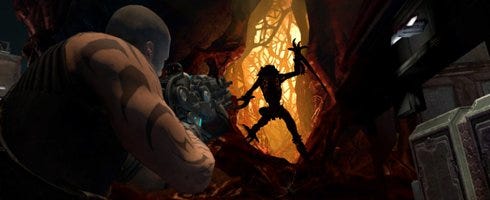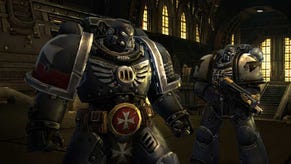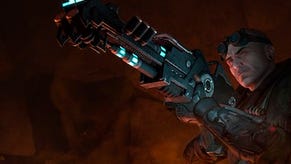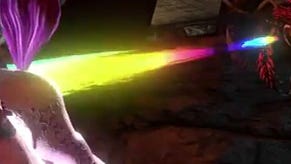Interview - Red Faction: Armageddon's David Abzug
Some videogames pontificate on the deeper themes of love, loss, and control - ultimately causing players to see the world in a new light once they've dabbed the tears from their eyes. Other videogames grab a giant hammer - that, in some cases, is an ostrich that somehow migrated to Mars - and gleefully lay waste to everything in sight.
Red Faction: Guerrilla was most certainly the latter.
A surprise hit, Guerrilla sneaked under gamers' radars and smacked them with all the subtlety of the animal it's not named after. Thanks to Volition's Geo-Mod destruction engine, sending buildings tumbling down had never been more satisfying. Sure, the game didn't reinvent any wheels, but it definitely made them explode real nice.
This, however, raises a question: if your game isn't broken (well, minus the billions of space dollars in property damages), how do you fix it? Our magic videogame eight ball tells us "Make it bigger! Duh." But that's not quite the approach Volition's taking. Instead, Armageddon's ditching its colossal open-world for a more constrained underground setting. So long, freedom. Hello, linearity. How are the kids?
Frightened? Curious? We sure were. So we quizzed lead designer David Abzug on everything from the whys and hows of Armageddon's switch to a more linear format, to new additions to the Geo-Mod engine, to potential Kinect/Move support in a Red Faction game.
Read all about it after the break.
Interview by Nathan Grayson.
VG247: First, a burning question - for me, anyway: How open is RFA going to be? Mines imply sort of a constrained, linear environment, whereas Guerrilla was this huge, expansive experience. Am I wrong to assume that?
David Abzug: Guerrilla was very much a huge, expansive experience, and I thought they did a great job with it. We got to build off a lot of the stuff the RFG team did, and we’re very excited to do that – especially with the destruction engine.
But there were two specific things we set out to change to some extent. The first one of those was the fact that, because of the destruction engine – and this was a conscious choice – Guerrilla was a huge world and there was a lot of driving in it. There was a lot of space between each area. And that was partially because of the destruction engine and how it cost so many resources. There’s a reason why nobody does destruction, and that’s because it’s expensive to do.
And the other thing was that a lot of the reviews were mentioning the story for RFG as being a little light. So we set out to both reduce the distance between the gameplay and to be able to tell a tighter, more integrated story. And in both of those cases, going to the underground environment where we got to have the walls and the caverns to block views and stuff – having the more linear environment – helped with that.
And so, the gameplay from Red Faction: Guerrilla is still there. What we’ve mostly managed to get rid of is the driving back-and-forth between worlds.
Does it still have any sort of open-world component?
No. It is a more linear experience than RFG. There’s no doubt about that.
How much of a role will wanton destruction of buildings play in RFA? Honestly, I could take or leave RFG’s missions, but I spent hours just knocking stuff down and waging mini-wars against the Earth Defense Force.
There’s still plenty of stuff for you to knock down, and with the Repair Tool, you can rebuild it and knock it back down again if you feel like it. In fact, the Repair Tool – with some of the things it can do – if you knock down an eight-story building, you can rebuild the whole friggin’ thing. All eight stories of it.
But I can’t go on those GTA-style rampages? Is there any downtime between missions to just mess around with the destruction engine?
No. It is more of a linear experience.
The RFA trailer I saw had no hammer! Will the RFA’s hero ever take up his grandfather’s big honking hammer? What about his big, literally honking Ostrich hammer?
We’ve got the hammer. The hammer is there!
As for the Ostrich hammer, it’s part of RFG. I’d like to think that we will come up with something to equal it.
Emu hammer?
Now if I told you what it was going to be, would it be that much fun when you found it?
No, probably not.
[Laughs].
You mentioned that one of the things people complained most about in RFG was the amount of driving you had to do. So how much of a role do vehicles play this time around?
Vehicles are more there as part of the gameplay than as getting to the gameplay. We’ve moved forward a couple generations in [in-game] time from the events of RFG, and technology’s had a chance to develop. So rather than you having a pick-up truck or some standard vehicle to drive, we’ve got some more exotic things for you – like the Red Faction Leo [mech]. That’s one of our vehicles.
And so you’re going to be doing more along the lines of stuff that you couldn’t drive in today’s world.
How much has the destruction engine evolved since Guerrilla? Are things even more destructible this time around? Also, will we ever encounter any improbable situations where one tiny support beam – The Little Support Beam That Could -- is holding up an entire building?
We have done some modification to the Geo-Mod engine – partly in order to minimize stuff like that, and partly to make the destruction more large-scale and realistic. Another one of the things people noticed about RFG was how you’d collapse, like, a four-story building and it’d all sort of dissolve when it hit the ground. We’ve done some work on that kind of stuff as well.
Most of what we’ve done, like I said, is stand on the shoulders of giants. The RFG team did an enormous job – they hauled a huge load. The difficulty of getting real physics-based destruction into a game world – I cannot say how big it is. It’s insane. We had a lot of people with really big heads working on that for a long time. And that limited – on some level – what they could do with the design of the game. They were building the destruction system at the same time they were building the game.
Then they handed it to us and we got to say, “What can we do that’s fun with this?” So we got to start with the destruction system and figure out where to go from there. That’s one of the reasons why we went underground. Destruction is more fun when you’ve got 100-ft. high walls that you can hang things off of. When you’ve got ceilings with giant lighting fixtures that you can actually destroy and send flying. And then we asked ourselves what weapons and tools we could come up with to let the player play with that would be cool by themselves, but are even better because of the existence of destruction.
The perfect example is the magnet gun, which you got to see. It takes whatever you launch the first projectile at, and it sends that flying wherever you launch the second projectile. In any other game, that would be a fun tool. You could grab a barrel and throw it at someone or grab a bad guy and throw him at a wall. We get to rip the side off a building and send it flying. My standard line is that we don’t have Seven Elevens in our game, but if we did, you could throw the Seven Eleven. Launch it across a football field and into the front rank of the enemies that are attacking.
If the Geo-Mod engine has such potential to be a game-changer, why not license it out to other developers?
That is a question for my corporate overlords, and not for a humble game designer such as I.
One of my favorite aspects of Guerrilla was actually how light its story was. In a sense, it was almost a pure game. I found it to be very Crackdown-esque in that respect. Why did you decide not to take that ball and run with it? Why did you instead decide to go the story-centric route?
Right now, I don’t think the two are mutually exclusive. There’s nothing in our story that keeps you from ripping down every building that you come across. There’s nothing in our story that keeps you from wreaking havoc wherever you go. That’s not the point of it.
What it does is, we intentionally moved the story in time specifically to bring in new weapons and new technologies. If it took place three years after RFG and you had the Nanoforge strapped to your left arm and the ability to repair anything and a gun that flings physical objects all over the place, [that wouldn’t make much sense]. Not to mention that those aren’t the most exotic things we’ve got; they’re just the most exotic things we’ve shown.
We said, “we want to go more sci-fi with it.” And so we moved the game forward in time to do that. So that moved the game forward a couple generations. We wanted to keep ties with RFG. We wanted to be the same world – just the difference between 1950’s United States and 2000 United States. And, you know, the differences are huge. So we said, “Well, let’s make him the grandson of [RFG main character] Alec.” Now, Alec was a fish-out-of-water when he first showed up, so he was perfect for a more disjointed, lighter story. Because he was new to the world.
Well, Darius grew up in this world. He’s got compatriots that he comes across. He’s got friends that he knows. He’s been part of the world, so it’s natural for his story to be a more involved one than in the previous game. On top of that, we wanted to tell a more involved story. We like the idea of using games to tell story. I’m not gonna say we were dragged into it. We jumped into it willingly.
One of Armageddon’s trailers had a bit where an alien snuck up on a guy and sliced him to ribbons, and the whole scene was done up in horror trappings. Is Armageddon still going to be all about the chaotic battles of Guerrilla, or will certain moments slow the pace and instill a bit of a horror element?
We are not a horror game. We are an action game set in a horrific world. There’s a mystery to be solved, but you watched the game; when you got into combat, it was pure action. It was the chaos and the creatures jumping and being all over the place – actually being up on walls shooting at you. It was you blasting them and getting into the [mech] and pounding five of them in one shot with a big shoulder bash, and then using rockets to clear out the rest.
We’re a pure, adrenaline-fueled action game. It’s the tone of the world. You know, it’s like the difference between Doom and Duke Nukem. Doom is a shooter. Duke Nukem’s a shooter. The feel of the worlds is very different, but they’re still shooters.
Knocking s**t down with Kinect or Move would be amazing. It very strongly appeals to the side of me that I suspect was Godzilla in a previous life. Would you ever consider adding support for those peripherals to a Red Faction game?
Would I consider it? Oh yeah. Right now, we’re finishing the game we’ve got. And then we’re gonna figure out where to go from there.
What about Armageddon’s multiplayer? Guerrilla’s was actually pretty awesome. Are you looking to improve on that? How much of a priority is it this time around?
Multiplayer is a major priority. We have some very interesting plans for it that are showing up very well in testing. But we will be unveiling them at a later time.
Has the partnership with Syfy affected RFA’s development at all? Has Syfy had any input during the game’s development process?
I am not allowed to comment on our partnership with Syfy.
I will say that no, I’ve felt no worries from that on the game development end. But I’m not allowed to talk about any partnership with Syfy.
Are you planning any sort of demo or beta for Armageddon?
We’re still discussing it. I, personally, would really like to. I was the first proponent for the multiplayer beta of Red Faction: Guerrilla. I was in charge of Red Faction Guerrilla’s multiplayer, and I was the first one pushing for that beta.








